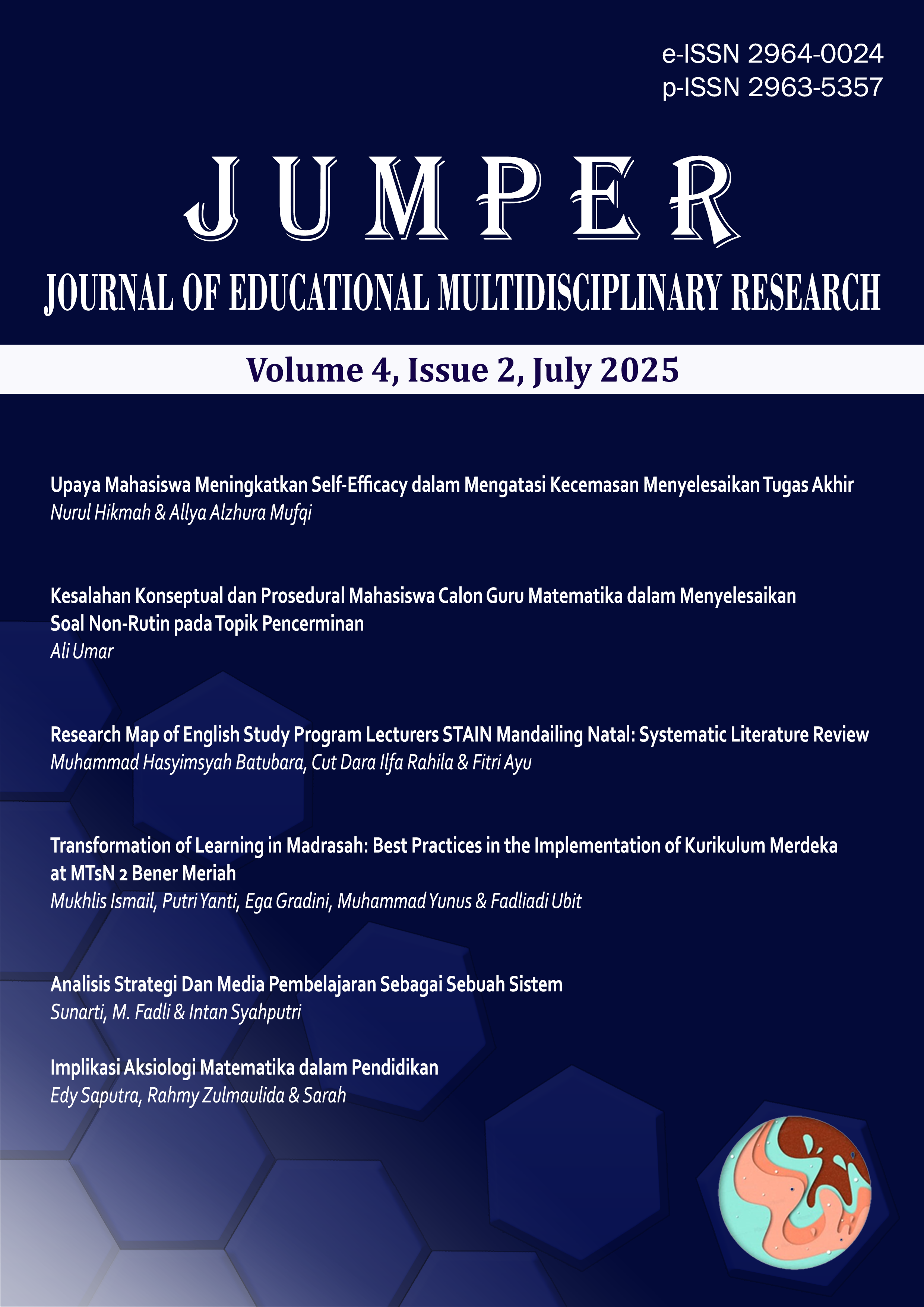Implikasi Aksiologi Matematika dalam Pendidikan
DOI:
https://doi.org/10.56921/jumper.v4i2.320Keywords:
Aksiologi, Mathematic, ApproachesAbstract
This research investigates the concept of Mathematical Axiology and its relation to mathematics education. Mathematical Axiology is a branch of mathematical philosophy that deals with the values, ethics, and principles underlying mathematics. This study aims to provide a brief overview of the importance of understanding mathematical axiology in the context of mathematics education. The research method used is a literature study with qualitative analysis of relevant sources. The results of this study reveal that understanding mathematical axiology has significant implications in mathematics education. It helps in promoting mathematical values, such as beauty and relevance, and developing mathematical ethics in problem-solving and decision-making. In addition, this study identifies recent developments in mathematical axiology, including the exploration of mathematical values in everyday life, ethics in algorithm development, and the link between mathematical axiology and student character development. The conclusion of this study is that mathematical axiology is an important aspect of mathematics education that can help create a generation that thinks critically, ethically, and understands mathematical values in a variety of contexts. The results of this study can provide guidance for mathematics educators, researchers, and policymakers in developing more holistic and relevant educational approaches to mathematics teaching.
References
Bahrum. (2013). Ontologi, Epistemologi Dan Aksiologi. Sulesana Jurnal Wawasan Keislaman, 8(2), 35–45.
Dwiyanto, D. (2002). Metode Kualitatif: Penerapannya dalam Penelitian. Diakses Dari: Https://Www. Academia. Edu/Download/45555425/Metode_kualitatif_penerapannya_dalam_penelitian. Pdf (Diakses Pada 28 September 2019).
Hansen, S., Hansun, S., Setiawan, A. F., & Rostiyanti, S. (2023). Etika Penelitian: Teori dan Praktik.
Karim, A. (2014). Sejarah perkembangan ilmu pengetahuan. Fikrah, 2(2).
Mahfud, M. (2018). Mengenal Ontologi, Epistemologi, Aksiologi Dalam Matematika. CENDEKIA: Jurnal Studi Keislaman, 4(1).
Marliani, M. (2021). MATEMATIKA DALAM AKSIOLOGI: Mathematics In Axiology. Tunas: Jurnal Pendidikan Guru Sekolah Dasar, 7(1), 26–31.
Maryati, I., & Priatna, N. (2017). Integrasi nilai-nilai karakter matematika melalui pembelajaran kontekstual. Mosharafa: Jurnal Pendidikan Matematika, 6(3), 333–344.
Sadewo, Y. D., Purnasari, P. D., & Muslim, S. (2022). Filsafat Matematika: Kedudukan, Peran, Dan Persepektif Permasalahan Dalam Pembelajaran Matematika. Inovasi Pembangunan: Jurnal Kelitbangan, 10(01), 15–28.
Semenov, A. (2024). Axiology of Primary Mathematical Education VALUE SYSTEM. February, 7–12.
Susanto, H. A. (2012). Nilai matematika dan pendidikan matematika dalam pembentukan kepribadian. Jurnal Pendidikan Dan Pembelajaran (JPP), 19(1), 116–124.
Syukri, A., & Rizki, A. F. (2021). Aksiologi Ilmu Pengetahuan dan Manfaatnya bagi Manusia. 4(2), 186–194.
YASA, I. M. A. D. I., Sadra, I. W., & Suweken, G. (2013). Pengaruh pendidikan matematika realistik dan gaya kognitif terhadap prestasi belajar matematika siswa. Jurnal Pendidikan Dan Pembelajaran Matematika Indonesia, 2(2).
http://jp.feb.unsoed.ac.id/index.php/sca-1/article/view/134/139
Downloads
Published
How to Cite
Issue
Section
License
Copyright (c) 2025 Edy Saputra, Rahmy Zulmaulida, Sarah

This work is licensed under a Creative Commons Attribution-ShareAlike 4.0 International License.














